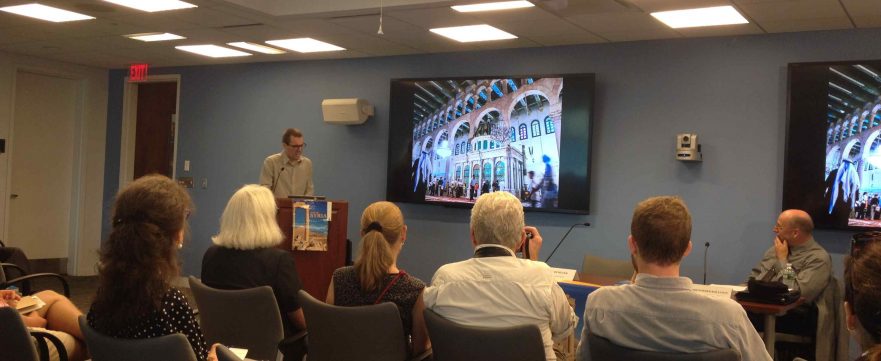On September 22 Daniel Demeter, author of the stunning new photography book Lens on Syria: A Photographic Tour of its Ancient and Modern Culture, shared some of the lovely images from the books (and the stories behind them) to George Washington University in Washington DC.
Ambassador Edward Gnehm, a faculty member at GWU’s Elliott School of International Affairs and the Director of the school’s Middle East Policy Forum, provided a lovely introduction, noting that Syria had been one of his favorite places to visit.
Demeter’s presentation covered the breadth and length of Syria, tracking the broad “itinerary” followed by the book’s seven chapters. But still, he was able to share only a fraction of the images contained in Lens on Syria, a handsome, 304-page volume in full color containing photos he shot all around the country between 2006 and 2009. (The book is published in both hardcover and paperback.)
Demeter– some in his audience– became visibly shaken while he talked about the violence that has overtaken Syria in the years since he lived there.
His slides captured gorgeous architecture dating back as far as 3,000 years… people going about their daily lives… and bustling, colorful markets stocked with textiles and spices. The colors and smells were almost tangible.
The sites that his photography documented include Sunni, Shia, Christian, Roman, and Byzantine religious sites; Hittite sculptures; towering fortresses from many eras; lovely mountain, desert, and coastal landscapes; and even towns where Western Aramaic is still spoken.
His presentation was a visual tour through the rich history, as well as geography, of Syria. He visited castles that had been in use during the Crusades. In his presentation at GWU, he narrated the significance of the structures as well as their fate in the course of the current conflict.
In Palmyra, his photos depicted the tombs and colonnades, including two temples that ISIS later, quite intentionally destroyed with explosives. Nothing remains, Daniel noted, save for the entrance gate of one. The old city of Aleppo has been devastated, and the market has been badly damaged as the city is at the front lines of the fighting.
The climate and vegetation that he found along Syria’s Mediterranean coast reminded Demeter of his home state of California. One slide showed a gorgeous, little-known beach, a hidden favorite of locals– who had apparently asked him not to publicize it for fear that it would become overrun with tourists. (Sadly, due to the ongoing violence, there is little risk of that happening in the near future.)
Professor Christopher Rollston of GWU joined Demeter to contribute further historical context. Dr. Rollston, seated at right in the photos above, is a specialist in ancient Semitic languages who has done excavations in Syria. He spoke passionately about the country’s ancient texts and artifacts. He noted that they provide some of the earliest evidence of phonetic writing and some of the earliest written contracts, religious texts, and epics, and thereby contributed a great deal to the recorded history of humanity.
He noted that one of the great values of “Daniel’s marvelous book” is that it presents images of sites that have since been wholly or partially destroyed, or extensively looted. (In some cases, he said, ISIS had faked the destruction of antiquities, which later surfaced on the black market in Israel.)
During the Q&A session, Demeter noted that he hopes to return to Syria as soon as it becomes possible. Among other things, there are still some remote sites of archeological significance that he has not yet had an opportunity to visit.
He observed that today’s Syria may be riven by divisions both sectarian and political but that its people are united by the value they place on their shared cultural heritage.
After leaving Washington DC, Demeter traveled to Harrisonburg, VA. There, and later in our hometown of Charlottesville, VA, he joined with Theresa Kubasak and Gabe Huck to share with community groups their reflections on Syria’s rich history and folkways and its traditionally diverse and welcoming culture. Kubasak and Huck are the authors of Never Can I Write of Damascus: When Syria Became Our Home, which was published by Just World Books in early June.
We’re hoping to make photos of these events (and a video of the GWU event) available soon.

